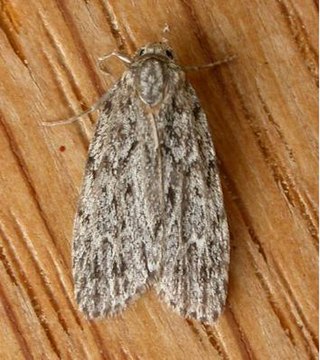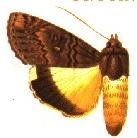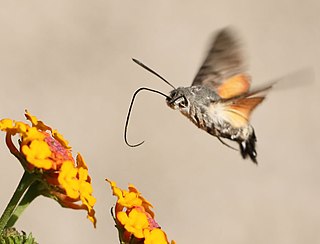
Moths are a group of insects that includes all members of the order Lepidoptera that are not butterflies. They were previously classified as suborder Heterocera, but the group is paraphyletic with respect to butterflies and neither subordinate taxon is used in modern classifications. Moths make up the vast majority of the order. There are approximately 160,000 species of moth, many of which have yet to be described. Most species of moth are nocturnal, although there are also crepuscular and diurnal species.

The Pterophoridae or plume moths are a family of Lepidoptera with unusually modified wings, giving them the shape of a narrow winged airplane. Though they belong to the Apoditrysia like the larger moths and the butterflies, unlike these they are tiny and were formerly included among the assemblage called "microlepidoptera".

Opodiphthera eucalypti, the emperor gum moth, is a species of moth in the family Saturniidae native to Australia. This species was formerly placed in the genus Antheraea.

The Hepialidae are a family of insects in the lepidopteran order. Moths of this family are often referred to as swift moths or ghost moths.

Eupterotidae is a family of insects in the order Lepidoptera with more than 300 described species.

Actias ningpoana, the Chinese moon moth, is a species of moth in the family Saturniidae. The species was first described by father-and-son entomologists Cajetan and Rudolf Felder in 1862. It is quite large, and has long, curved, hindwing tails. There are many congeners across Asia; the Luna moth of eastern Canada and the United States is a close relative.

The Saturniinae or saturniines are a subfamily of the family Saturniidae, also known as giant silkmoths. They are commonly known as emperor moths or wild silk moths. They are easily spotted by the eyespots on the upper surface of their wings. Some exhibit realistic eye-like markings, whilst others have adapted the eyespots to form crescent moon or angular shapes or have lost their wing scales to create transparent windows. They are medium to very large moths, with adult wingspans ranging from 7.5 to 15 cm, in some cases even more. They consist of some of the largest sized Lepidoptera, such as the luna moth, atlas moth, and many more. The Saturniinae is an important source of wild silk and human food in many different cultures.

Halone is a genus of moths in the subfamily Arctiinae from southern Asia and Australia. The genus was erected by Francis Walker in 1854.

Bleninae is a monotypic subfamily of the moth family Nolidae. Its single genus, Blenina, was erected by Francis Walker in 1858.

Acontia is a genus of moths of the family Noctuidae. The genus was named by Ferdinand Ochsenheimer in 1816. Eusceptis, Pseudalypia and Spragueia are sometimes included in the present genus, but here they are tentatively treated as different pending further research. Many species of Tarache were also once placed here.

Ulotrichopus is a genus of moths in the family Erebidae. The genus was described by Wallengren in 1860.

Leucania is a genus of moths of the family Noctuidae first described by Ferdinand Ochsenheimer in 1816.

Opogona is a genus of the fungus moth family, Tineidae. Therein, it belongs to the subfamily Hieroxestinae. As it includes Opogona omoscopa, the type species of the now-abolished genus Hieroxestis, it is the type genus of its subfamily.

Macroglossini is a tribe of moths of the family Sphingidae described by Thaddeus William Harris in 1839.
Neodiphthera is a genus of moths in the family Saturniidae. It was described by David Stephen Fletcher in 1982.

Usta is a genus of moths in the family Saturniidae first described by Hans Daniel Johan Wallengren in 1863.
Ludia is a genus of moths in the family Saturniidae. It was first described by Hans Daniel Johan Wallengren in 1865.














